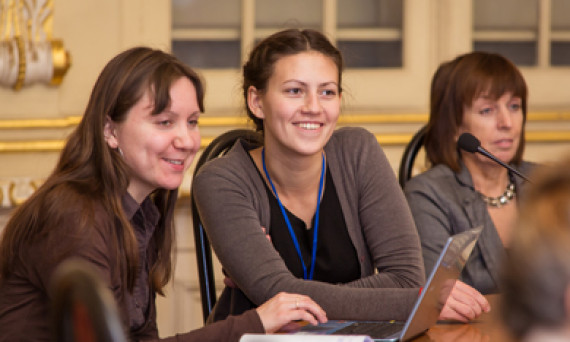The International School on the Sociology of Science and Technology organized jointly by the EUSP’s Center for Science and Technology Studies and the St. Petersburg branch of the Institute for the History of Science and Technology (Russian Academy of Sciences) was held.
The school’s 30th session was named “The Russian Scientometrics: Past, Present and Future. Fifty Years of the Russian Sociology of Science.” Scientists and researchers came from the United States, Finland, Belarus, and many Russian cities.
The October 29th a meeting took place at the EUSP. At the end of the school, the most persevering participants conducted a round table discussion at which researchers presented short reports on a wide range of topics related to issues and current trends in the sciences in both Russia and abroad. The round table was presented as a patchwork quilt covering a multiplicity of topics; a flight of fancy on the topic of modern technology was combined for a short while with nostalgia for Soviet science and lamentation on the state of Russian science and education.
Elena Evdokimova’s report “The Adaptive Approach to the Problem of the Reproduction of Scientific Personnel” was dedicated to the specific characteristics of scientists as a group. She spoke of how the scientific profession involves certain skills that allow one to easily adjust to a changing socio-economic context, including the ability to process information combined with high cognitive motivation. Thanks to the particularities of their profession, scientists are ideally aligned with the current tendencies of the global labor market, which presumes flexibility, diversity, competition, motivation as a behavioral strategy, and network organization. Science’s organizational forms have allowed scientists to successfully adjust to an unstable and changing environment.
Elena Elkina gave a report on interdisciplinary studies in the Russian sociology of science. In ten minutes, Elkina attempted to discuss all of the current trends in western science, as well as the problem of a lack of direction in the “methodology and scientific logic” in Russian science sociology. She believes that the scientific-sociological discipline of “methodology and scientific logic,” which developed in the Soviet Union, has been forgotten by Russian science, entailing problems that cannot be resolved. The second part of her ten-minute report concerned the issue of the convergence of sociology, biology, information sciences, and other disciplines. Interdisciplinary studies amassed popularity in the 1980s, as evidenced by increased funding for laboratories and research centers involved in interdisciplinary research. Elkina enthusiastically described new projects developed on the basis of interdisciplinary studies, such as the human genome project and energy research. The convergence of physics, chemistry, biology and informatics led to entities such as atoms and neurons being understood as interchangeable parts. The goal of convergence is to unite the natural and artificial, as in the case of micro chipping.
Galina Eremicheva reported on problems of innovation development in academic and university science. The reforming of the Russian Academy of Science was met with conflicting feelings among Russian science teachers. Researchers spoke with a number of scholars and came to the conclusion that reforming the RAS was necessary, although it was perceived ambiguously. Scientists lamented the decline in continuity amongst scholars, and in particular, the fact that a large number of young scholars occupy high posts. Dissatisfaction is also caused by low levels of financing for teaching positions, and the lack of student interest in research. In order to overcome this crisis, a merger of university and academic science is necessary.
The following presenter planned to report information technology in contemporary science sociology, but ended up speaking about modern means of communication in the humanities, where a particular feature of information technology is that communication coexists with manipulation. The sociology of science is included in the process of informatization, where, with other humanitarian disciplines, it is faced with the problem of the relationship between communicative and manipulative functions. The last report was on naukograds or “science cities,” corporate culture, and its evolution in the Soviet Union and contemporary Russia.
Sofya Lopatina






























